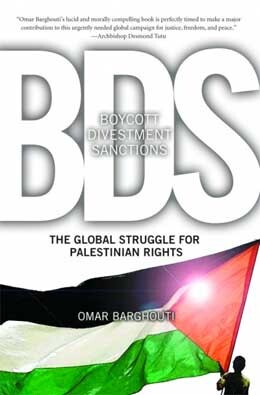The Electronic Intifada 22 April 2011

“Our South Africa moment has finally arrived,” said Palestinian author-activist Omar Barghouti in a series of speeches delivered in 2010. With the publication of BDS: The Global Struggle for Palestinian Rights, the first book dedicated to the game-changing boycott, divestment and sanctions movement — known by the initials BDS — has itself finally arrived.
The long-awaited volume aims to summarize the key arguments that Barghouti — a co-founder of the movement — has been making in the six years that he has been working to rally global support for the landmark 2005 Palestinian BDS call.
Something between a monograph and an anthology, the volume brings together essays, open letters (some co-authored), interview transcripts and even a campaign case study. These elements, while stylistically varied, revolve around the same three central points: first, that the nature of the oppression visited upon Palestinians by Israel resembles, in many ways, the situation of black South Africans under apartheid; second, that this oppression must be actively resisted; and third, that the growing BDS movement provides the most moral, efficient and effective mechanism for conducting that resistance.
Barghouti does not suggest that Israel’s policies toward Palestinians precisely mirror those of apartheid South Africa, however. “Israel’s version of apartheid is more sophisticated than South Africa’s was,” he explains. “It’s an evolved form” (167). He points out numerous similarities as well as differences, noting that many of the distinctions are the result of the fact that “South Africa, unlike Israel, did not employ ethnic cleansing to expel most of the indigenous population out of the country … In South Africa, the overall plan was to exploit blacks, not throw them out” (169).
As the author demonstrates, many of Israel’s practices in maintaining the resulting system of institutional inequality are clearly worse than those of South Africa under apartheid. To those who dispute the label of “apartheid” to describe Israel, Barghouti notes that apartheid has “for decades been recognized by the United Nations as a generalized crime with a universal definition” (199).
Drawing much of its inspiration from the South African struggle, Barghouti explains that the BDS movement represents a “qualitatively new stage” in the history of Palestinian resistance to colonization and occupation (61). As expressed in a quoted statement by Palestine’s BDS National Committee (BNC), “Israel’s impunity is the direct result of the international community’s failure to hold it accountable” for its behavior (209).
The existence of a Palestinian-led movement which asks its international supporters to demonstrate solidarity not only in words, but through concrete actions, has effectively broken this cycle. Now, as a result of worldwide BDS efforts, companies directly profiting from the oppression of Palestinians “are experiencing real, deep losses that are directly connected” with their complicity in Israeli apartheid (165). Thus, “the BDS movement has dragged Israel and its well-financed, bullying lobbying groups onto a battlefield where the moral superiority of the Palestinian quest for self-determination, justice, freedom and equality neutralizes and outweighs Israel’s military power and financial prowess” (62).
Barghouti excels in distilling the arguments surrounding BDS down to their essentials. It is precisely because of his insistent focus on these fundamental issues that it has become all but impossible to find articulate holders of opposing views willing to engage him in public debate. As Barghouti makes plainly clear, the bottom line in the relationship between the core, rights-based demands of the BDS movement, and the positions of all those who oppose them, is that those who continue to support the concept of a “Jewish state” — from “soft Zionists” on the left to the overt proponents of genocide on the right — advocate a system of society in which rights are bestowed, abridged, or denied on the basis of ethnic origin, while the BDS movement insists that all human beings must be treated as equals.
Rather than admit to the nature of this distinction, those who oppose the BDS movement on the basis of political conviction consistently resort to other arguments. Some address the goals of the BDS movement, but many simply the means. Both types of arguments are deftly deconstructed by Barghouti, who hones in on their inherent flaws like a hypocrisy-seeking missile.
Barghouti’s skill at exposing the often racist assumptions and double-standards which undermine the contentions of BDS opponents is most clearly evident in his discussion of academic boycott, a subject treated extensively in the volume.
Critics who challenge academic boycott of Israel on the grounds that it jeopardizes the academic freedom of Israelis, the author says, “completely ignore that by denying Palestinians their basic rights — all our freedoms — Israel is infringing deeply on our academic freedom. That doesn’t count, it seems … Those who care about academic freedom only when it pertains to Jewish Israelis — perceived as ‘white,’ ‘European,’ ‘civilized’ — and not when it pertains to us brown Palestinians are hypocritical, to put it mildly” (174-175).
Barghouti emphasizes the anti-racist position which forms an explicit pillar of the BDS movement’s platform: “Individuals who believe that some are more human or deserve more rights than others based on differences in ethnic, religious, gender, sexual, or any other human identity attributes cannot belong to this consistently antiracist struggle for universal rights,” he states (33). The author turns accusations of inherent anti-Semitism in the movement on their head: “Characterizing actions and positions that target Israeli apartheid and colonial rule as anti-Semitic is itself anti-Semitic, for such arguments assume that Jews are a monolithic sum that Israel represents and speaks on behalf of and, moreover, that all Jews per se are somehow responsible for Israeli crimes, a patently racist assumption” (149).
The author does not mince words in criticizing projects which “normalize” the current state of affairs between Israel and the Palestinians. “Joint projects that claim to be ‘apolitical’ are often the most blatantly politicized,” he writes, for they “deliberately disregard the context of colonial oppression and imply the possibility of achieving peace without addressing the root causes of conflict” (140).
True peace cannot possibly be achieved in such a context, Barghouti argues: “A master and a slave can reach an agreement where the enslavement is accepted as reality and the slave cannot challenge it but only make the best out of it. There is no war — no conflict, nobody is killing anybody — but the master remains master and the slave remains slave. That is not the kind of peace that we, the oppressed, are seeking or can ever resign ourselves to” (173).
With Palestinians in Gaza facing a man-made catastrophe as a result of a siege deliberately crafted to push the entire population to the brink of destruction, Barghouti argues, BDS has become a moral imperative: “Unless the price of its system of oppression is sufficiently raised through concerted civil-society pressure campaigns, [Israel] will never give it up,” he writes (173). “In short, Palestinians cannot wait. Israel is no longer ‘just’ guilty of occupation, colonization and apartheid against the people of Palestine … It has embarked on what seems to be its final effort to literally disappear the ‘Palestinian problem.’ And it is doing so with utter impunity. The world cannot continue to watch. Thus BDS. Thus now” (47).
Barghouti does an admirable job of providing a lucid theoretical overview of BDS which incorporates many of the lessons learned in the activist trenches. It is nearly impossible to develop and articulate a perfect synthesis of “academic” and “activist” perspectives, but Barghouti arguably comes closer to bridging this divide than than any other figure writing in English. Though his writing undoubtedly leans slightly more toward the theoretical, his awareness of developments “on the ground” among activists actually implementing BDS campaigns around the world is impressive.
Readers are likely to notice that key facts and arguments are distributed, and sometimes repeated, throughout the volume, rather than being consolidated and treated sequentially. Some may view this as a flaw (though perhaps an unavoidable one, owing to the disparate nature of the source material), but others may see this as a deliberate choice by the author to help readers to keep central themes front-and-center as they engage with the material. The approach also ensures that those who choose to read only particular chapters will still likely be exposed to the most crucial elements.
In his conclusion, Barghouti states that BDS possesses “almost all the ingredients” necessary to end Israel’s multi-faceted oppression of Palestinians, but does not specify what ingredients remain missing (225). The book’s utility to activists would be strengthened if the author were to provide additional context here, describing with what other political forces BDS activists must engage in order to achieve the most concrete and lasting gains.
Barghouti is nevertheless convinced that BDS will serve as the central pillar in a strategy that will ultimately decide the outcome of the Palestinian struggle: “When Israel’s oppression is met with substantial resistance, primarily from the Palestinian people, the Arab world and the world at large, particularly in the form of sustainable BDS campaigns leading to comprehensive UN sanctions, as was the case in the struggle against South African apartheid, the Israeli economy will suffer tremendously and the BDS movement inside Israel will gain considerable momentum.” Among Israelis, this will lead to a massive evaporation of support for apartheid policies (who will themselves join the BDS movement in growing numbers), Barghouti predicts, and then “Collapse of the multitiered Israeli system of oppression … becomes a matter of time” (223).
Abraham Greenhouse is co-founder of the Palestine Freedom Project (www.palestinefreedom.org) which provides resources and logistical support to grassroots Palestine solidarity activists, and has been active in organizing BDS campaigns both prior and subsequent to the 2005 Palestinian civil society call for BDS. Follow him on Twitter as @grinhoyz.
Related Links





